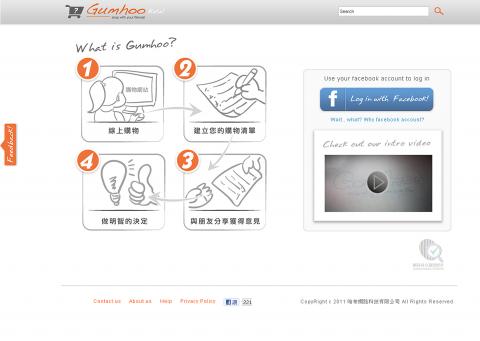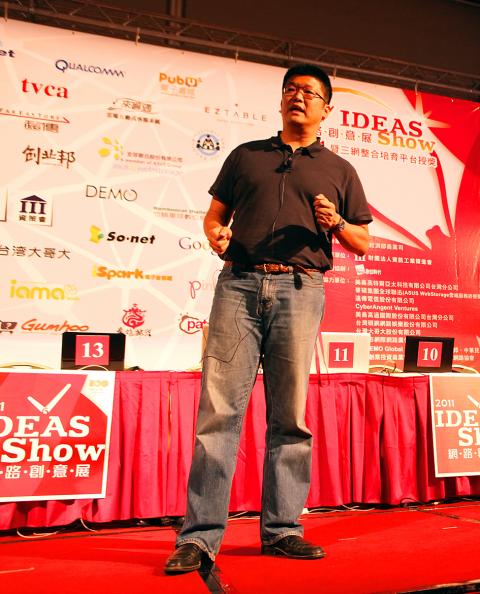Two start-ups, social shopping site Gumhoo and business-to-business platform Patisco, lent a Taiwanese presence to DEMO Fall, which took place earlier this week in Santa Clara, California. The biannual event, one of the top launchpads for emerging technology, is based in Silicon Valley. Previous participants from this country have included Atlaspost (地圖日記), which was purchased by Groupon in December. Gumhoo and Patisco were the first Taiwanese start-ups to present at the show since fall 2009. While neither won any prizes, Gumhoo caught the eye of Intel Capital, Intel Corporation’s investment arm, and Procter and Gamble has expressed an interest in using Patisco, says James Hill, an associate planner with III, of the Institute for Information Industry (III, 財團法人資訊工業策進會) IDEAS Institute, the Web start-up incubator that nominated both companies for the event. For more information about Gumhoo and Patisco, read on.
Gumhoo: Window-shopPING the Internet
Founder Taiku “TK” Chen (陳泰谷) envisions Gumhoo as a “universal shopping cart” that will give users a quick, easy way to reach out to friends for straightforward feedback about items.

Photo: Taipei Times and courtesy of Institute for Information Industry
The inspiration for Gumhoo (the name is a play on the Hoklo (commonly known as Taiwanese) for “is it good?”) came to Chen when he stumbled upon a jacket while out shopping.
“It was on sale and I wanted to buy it, but I couldn’t make a decision,” he says. “I thought sending a text message, e-mail or sharing it on Facebook were all too bothersome. There wasn’t a quick service.”
After logging onto the Web site with their Facebook accounts, users can install a button onto their Web site browser’s bookmark bar to use while browsing online stores. Gumhoo also has an iPhone app that allows users to take a quick snapshot of desired products in stores. Users are given the option of creating private or public lists with their items. Friends can give their opinion by hitting two buttons — “get it” or “hold.”

Photo: Taipei Times and courtesy of Institute for Information Industry
Gumhoo is still in its infancy — it went live in June and has about 400 users — but Chen has big plans for the Web site, which he hopes will hit 5,000 users by the end of this year. The Web site is currently funded by one angel investor (Chen’s father) but the company plans to start raising seed money after DEMO Fall.
In addition to the Taiwanese market, Chen wants to expand Gumhoo to the US, where he studied for two years. There, Gumhoo will compete against social shopping sites like Kaboodle (www.kaboodle.com) and Amazon.com’s wish lists.
Chen says that Gumhoo stands out because of its ease of use and privacy controls. He and his four-member team are currently deliberating adding functions like pricing comparison, a drag-and-drop interface to organize lists and a barcode scanner for smartphones.

Photo: Taipei Times and courtesy of Institute for Information Industry
“Our goal is to make a product that really helps people connect with friends while shopping and has the tools to help them make purchasing decisions,” says Chen.
Chen envisions users sharing their lists with small groups of about three to five friends. The Web site’s target demographic is women in their 20s to 40s, but Gumhoo also markets itself as a tool for families organizing their grocery lists, couples creating a wedding registry or friends looking for supplies while party planning.
The Gumhoo team hopes to develop partnerships with e-commerce sites like PayEasy (www.payeasy.com.tw) and Fashion Guide (www.fashionguide.com.tw). Online stores can embed a Gumhoo button onto their Web sites in exchange for demographic data and analytics that show which items are “Gumhooed” the most and how users vote on them. (Chen says the information will only be made available from lists users choose to make public).

Photo: Taipei Times and courtesy of Institute for Information Industry
For more information, visit www.gumhoo.com
Patisco: Connecting suppliers and their customers
Patisco is a cloud-based business-to-business platform that seeks to make life easier for suppliers, middlemen and clients.
Founder Even Chung (鍾亦恒) created Patisco after 15 years working for his family’s company, which sells bicycle parts to clients in Europe and Japan. Chung also spent seven years exporting textiles, consumer electronic components and GPS navigation systems.
Chung says all his trading experience has given him plenty of opportunities to see how things can go wrong. For example, he says a tiny omission in an e-mail sent by an assistant once cost him a chunk of revenue.
“My office lady thought she didn’t have to describe one detail of a component. She skipped just one line, but that one line cost me NT$500,000,” says Chung.
“I’ve realized that the essence of trading is pretty much the same: good communication, good relationships and good vision,” he adds.
Chung, who has spent four years developing Patisco and invested NT$10 million in the start-up, says its aim is to offer an alternative to e-mail by streamlining information and communication management. He hopes those features will help it compete against China-based Alibaba (www.alibaba.com), which focuses on keyword searches and advertisements.
“I was a heavy user of Alibaba and it was very troublesome for me. I put products on it and every day I would receive 20 to 30 inquiries from around the world,” says Chung.
Sending production and pricing information via individual e-mails was “time consuming and not productive,” he adds.
Patisco’s user interface allows suppliers and their customers to view several streams of information at once, including all correspondence related to an order, prototype sketches and product specifications. Companies can create comparison charts for items from different suppliers, ask for adjustments and negotiate prices. Supervisors are given the option of signing off on messages before they are sent. All data related to an order or project is automatically organized into files for archiving.
Patisco currently has about 270 companies using the platform on a trial basis. Though about half of those businesses are based in China, Chung envisions Patisco first expanding with paid licensees in Taiwan before moving on to English-speaking countries.
“A lot of people see us as a supply chain management platform, while suppliers see us as CRM [customer relationship management],” says Chung of Patisco’s software, which is patented in Taiwan. “But so far I haven’t really seen anyone putting the two things together and trying to make a harmonic connection between them.”
For more information, visit www.patisco.com

Mongolian influencer Anudari Daarya looks effortlessly glamorous and carefree in her social media posts — but the classically trained pianist’s road to acceptance as a transgender artist has been anything but easy. She is one of a growing number of Mongolian LGBTQ youth challenging stereotypes and fighting for acceptance through media representation in the socially conservative country. LGBTQ Mongolians often hide their identities from their employers and colleagues for fear of discrimination, with a survey by the non-profit LGBT Centre Mongolia showing that only 20 percent of people felt comfortable coming out at work. Daarya, 25, said she has faced discrimination since she

Three big changes have transformed the landscape of Taiwan’s local patronage factions: Increasing Democratic Progressive Party (DPP) involvement, rising new factions and the Chinese Nationalist Party’s (KMT) significantly weakened control. GREEN FACTIONS It is said that “south of the Zhuoshui River (濁水溪), there is no blue-green divide,” meaning that from Yunlin County south there is no difference between KMT and DPP politicians. This is not always true, but there is more than a grain of truth to it. Traditionally, DPP factions are viewed as national entities, with their primary function to secure plum positions in the party and government. This is not unusual

April 21 to April 27 Hsieh Er’s (謝娥) political fortunes were rising fast after she got out of jail and joined the Chinese Nationalist Party (KMT) in December 1945. Not only did she hold key positions in various committees, she was elected the only woman on the Taipei City Council and headed to Nanjing in 1946 as the sole Taiwanese female representative to the National Constituent Assembly. With the support of first lady Soong May-ling (宋美齡), she started the Taipei Women’s Association and Taiwan Provincial Women’s Association, where she

More than 75 years after the publication of Nineteen Eighty-Four, the Orwellian phrase “Big Brother is watching you” has become so familiar to most of the Taiwanese public that even those who haven’t read the novel recognize it. That phrase has now been given a new look by amateur translator Tsiu Ing-sing (周盈成), who recently completed the first full Taiwanese translation of George Orwell’s dystopian classic. Tsiu — who completed the nearly 160,000-word project in his spare time over four years — said his goal was to “prove it possible” that foreign literature could be rendered in Taiwanese. The translation is part of